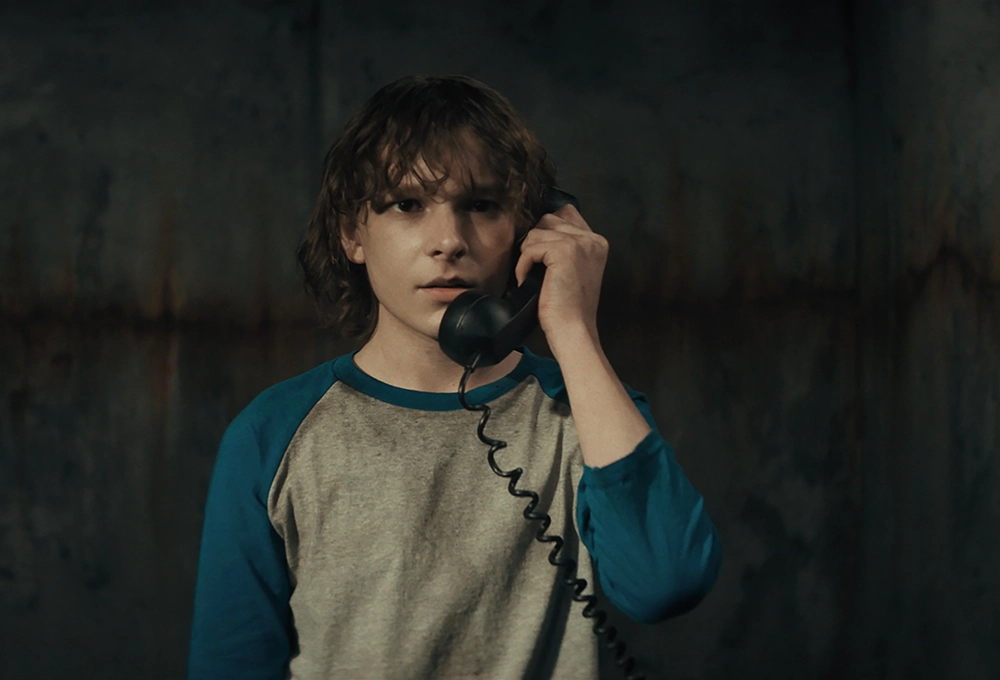“The Black Phone” (directed by Scott Derrickson and based on a short story by Joe Hill), though advertised as a horror film, is more of a thriller. However, because children are involved, and there are periodic scenes of children being physically abused in it, it can get quite horrific.
In a Denver suburb in 1978, a serial killer named “The Grabber” (Ethan Hawke) is kidnapping and killing children. When 13-year-old Finney (Mason Thames) is abducted and imprisoned in The Grabber’s soundproof basement, there seems to be no hope of him escaping. This is until the black rotary phone on the wall begins ringing. On the other end are the voices of The Grabber’s previous murdered victims, desperate to help Finney escape.
Perfectly Capturing Time and Place
Few films have captured a time period as perfectly as “The Black Phone.” Even if the opening scene didn’t come with a “Northern Denver, 1978” card, you’d immediately know what time period it is. The film starts in the midst of a youth baseball game, and with the retro uniforms and bright sunny day, for a moment you feel like you’ve stumbled into a “Bad News Bears” style coming-of-age film.
The film soon turns dark, though, as The Grabber’s van appears from nowhere and he takes his first victim. After this creepy opening, the film spends time with main characters Finney and his little sister Gwen (Madeleine McGraw). The pair have an alcoholic abusive father named Terrence (played by Jeremy Davies). Their mother died years ago and Terrence hasn’t been able to deal with her death. Both kids are routinely beaten by him, and the kids live a life where they’re constantly walking on eggshells.

In one scene, Finney and Terrence sit at the kitchen table having breakfast, while hungover Terrence is reading a newspaper. Finney eats, and Terrence yells at him for chewing too loud. Gwen walks in to get some bread out of a breadbox, and accidentally slams the lid on the box. Even for something as simple as this, Derrickson creates so much tension, as Gwen freezes and her father drops the paper and glowers at her. What’s her father going to do? It really puts you in the hellish life these poor kids are living.
Ethan Hawke Plays his Best Monstrous Villain
The film takes its time showing Finney and Gwen’s daily life. Their lives are harsh, especially for Finney, who is bullied and beaten up at school also. It’s heart-breaking watching this kid get beaten at home and at school; there seems to be no relief for him. The only bright spot in his life is his friend Robin (Miguel Cazarez Mora), who’s a pint-sized martial arts expert and ass-kicker. When Robin’s around, the bullies scatter like leaves in a windstorm. Unfortunately, Robin’s not around all the time.
The paranormal elements of the film are the most intriguing…”
Once we get to Finney’s abduction, the film becomes a battle of wills between Finney and The Grabber. Ethan Hawke’s Grabber wears a horned mask that makes him look like an ancient frozen demon. Despite never seeing his face, Hawke is able to give the character depth and creepiness through the use of movement and voice inflections. When he’s enraged, he talks in a deep growling voice that seems to bellow from the pits of Hell. When he’s got the upper hand and is content, his voice takes on an almost Jim Carrey-like playfulness that’s jarring. At times, he comes dangerously close to falling into a cliché horror villain like Freddy Krueger, but thankfully he never falls totally into parody.
The paranormal elements of the film are the most intriguing. We follow as Finney is visited at random by the spirits of the children The Grabber killed in the past. They communicate with Finney through the titular black phone that hangs on the wall in Finney’s basement prison, giving him cryptic clues in an attempt to help him escape.
The Young Actors Make this Film
The most fascinating character in the film is Gwen. As Finney’s younger sister, she has psychic abilities and can see events and places in her dreams. After Finney is abducted, she tries to find him via her dreams, but is constantly at odds with her father, who orders her never to talk about her visions, even when the police show up and start questioning her. Gwen’s journey throughout the film is as harrowing as Finney’s. She desperately tries to summon answers in her dreams and help the police. She tries to keep it hidden from her father, who’ll whip her with a belt at a moment’s notice.
Few films have captured a time period as perfectly as ‘The Black Phone.'”
Finney and Gwen are so well-written and well-acted, you get 100% invested in them and their plight. As a result, the film puts you through an emotional wringer of tension, dread, and fear. My only issue with the film was the infusion of comedy elements at random times during it, which threw off the pacing. Director Derrickson probably added these scenes as a form of temporary relief, like dialing back a pressure cooker, but they seemed out of place within the starkly tense plot of the film. Still, it’s a great film and recommended for anyone who loves a good thriller.
“The Black Phone” is currently only available to watch in theaters.
Support the Site: Consider becoming a sponsor to unlock exclusive, member-only content and help support The Movie Buff!